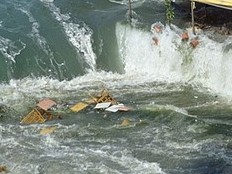"The earthquake and tsunami that have devastated Japan have shown how essential alert systems are," said UNESCO Director-General Irina Bokova. "In this context the development of a coordinated system in the Caribbean is more relevant than ever, enabling coastal countries to prepare in the event of such a disaster and to save human lives."
According to the scenario developed by the organizers (2) of the exercise, countries in the Caribbean will receive an alert on 23 March concerning a fictitious earthquake of 7.6 magnitude off the coast of the American Virgin Islands. Bulletins will be issued by the West Coast/Alaska Tsunami Warning Center (United States) for Puerto Rico and the Virgin Islands, and by the Pacific Tsunami Warning Center (PTWC) in Ewa Beach (Hawaii, US) for the rest of the area.
The exercise, named Caribe Wave 11, does not involve communities. It aims to test the effectiveness of alert, monitoring and warning systems among all the emergency management organizations (national focal points for tsunami alerts, weather forecast offices, national coast guard, etc.) throughout the region. The test is designed to determine whether Caribbean countries are ready to respond in the event of a dangerous tsunami. Simulated tsunami exercises have been organized previously in the Pacific in 2008 and in the Indian Ocean in 2009.
Previous experience underlines the crucial importance of rapid transmission of information. It has also shown that national authorities must take risk into account at all levels, including education about hazards in schools, urban planning in coastal zones, modification of building codes and materials, evacuation plans for communities and organization of effective emergency services.
(1) Countries involved :
Aruba, Antigua and Barbuda, Bahamas, Barbados, Belize, Bolivarian Republic of Venezuela, Brazil, Canada, Colombia, Costa Rica, Cuba, Dominica, Dominican Republic, France (Martinique, Guadeloupe, St Martin, Guyane), Grenada, Guatemala, Guyana, Haiti, Honduras, Jamaica, Mexico, Netherlands (Bonaire, Saba, Sint Eustatius, Curacao and Sint Marteen), Nicaragua, Panama, Peru, Saint Kitts and Nevis, Saint Lucia, Saint Vincent and the Grenadines, Sri Lanka, Suriname, Trinidad and Tobago, United Kingdom (Anguilla, British Virgin Islands, Bermuda, Cayman Islands, Montserrat, Turks and Caicos), United States
(2) Organizer of the exercise :
Intergovernmental Coordination Group for Tsunami and Other Coastal Hazards Warning System for the Caribbean and Adjacent Regions, the Caribbean Emergency Management Agency, the Centro de Coordinación para la Prevención de los Desastres Naturales en América Central, NOAA, and the U.S. National Tsunami Hazard Mitigation Program (NTHMP) are providing the framework for this exercise.
HL/ HaitiLibre
Source : Haitilibre.com

No comments:
Post a Comment